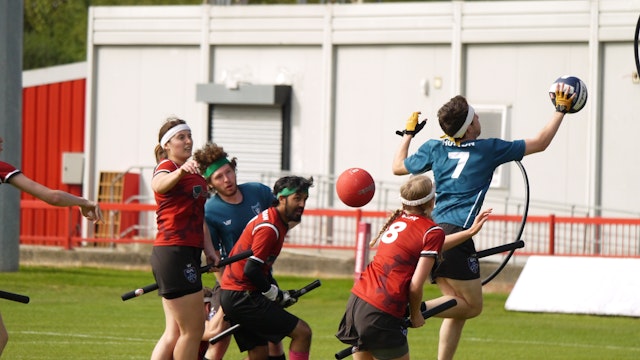Quidditch Premier League: how magical marketing, fanatical fans and gender inclusivity conjured a sport
Quidditch, once a fictional broomstick sport from the world of Harry Potter, is now in the hands of muggles with the first official UK tournament taking place this week. The Drum touched down with organisers to see how a fantasy sport can become a reality.
Quidditch is a convoluted sport conceived by Harry Potter author JK Rowling as the wizarding world's answer to ball games like football or rugby. In it witches and wizards atop broomsticks chase flying balls hoping to direct them into hoops while dodging and beating aggressive flying cannonballs. In the background two seekers chase another ball - this time tiny and golden and called the Golden Snitch - to bring about the end of the game and score a sizeable 150 points.
The concept is confusing and inarguably difficult to convert onto a real sports pitch without the physical aid of magic. While the sport has been growing a fandom in the US, the UK has had its first organised taste of the sport, courtesy of the Quidditch Premier League (QPL). The body was formed by comms professionals with a vision to make fiction a reality, assembling a competition from a sport that has been played by clubs in London, Leeds, Bristol and beyond since about 2012.
The Drum sat down with Jack Lennard, founder and director of the QPL, of Hawthorn Advisors, and QPL comms director Tom Ffiske, a staff member of Porter Novelli London to discuss the difficulties of forming a physical sport plucked from the narrative of a children's book.
In addition to battling the negative connotations around the activity, Ffiske wants to communicate that quidditch is a "competitive, athletic and gender-inclusive sport", that is "inspired" by the Harry Potter series, but not completely by the book.
The rules have been suitably tweaked to make the game actually playable, and more importantly, fun, in real life, Ffiske claims.

The key difference for Ffiske between the perception of the sport - and the reality of it for QPL - is that QPL's version of the sport "isn’t played by kids with capes", but rather it is played by "athletic adults with a drive to win".
But creating a sport from scratch is hard, and its uncommon for newly-formed sports to have pre-existing fanbases to tap into, so organisers are still leaning on the Harry Potter brand to help the new sport become mainstream.
"We have the careful balance of tapping into the popularity of Harry Potter, while solidifying our unique and separate identity," Ffiske said.
The sport is finding its feet in UK universities because “it’s different, an activity to play with the new friends you make, and at a time in the person’s life when they are more ready to see something else", he said. Starting at university levels means a trend is emerging where people go on to play long after they leave their studies, Ffiske said.
What's more, much like anything vaguely Harry Potter flavoured, quidditch runs exceptionally well on social media, so this tool is being carefully utilised by the founders. An endorsement from Rowling on Twitter also reportedly instantly increased its fan base by around 500%, showing the power of support from the right people.
To keep the drive alive however, quidditch will need sponsors and broadcasters to support it and help spread the word.
But Ffiske is quietly confident, boasting of a unique and lucrative audience: "Football and rugby have a very particular audience which, while enthusiastic and well-established, alienates many others from entering the world of sports. Not all supporters of sports have the same mentality of a typical fan; and for many, they may feel separate from sport culture," he said.
"Quidditch offers an alternative for many reasons. For one, we are aware that it is an alternative sport with a more peculiar playstyle - we fully embrace it as it is part of our identity and appeal," he added.
Furthermore, and perhaps more importantly, there is no gender segregation like in other sports, which Ffiske believes is a real hook for sponsors: “They may be interested in our alternative play style, our rapid growth, and our gender-inclusivity. In a world of traditional sponsors based around well-established teams, supporting an alternative sport with very clear diversity guidelines, and labelled as the ‘world’s most progressive sport,’ may be very appealing.”
Founder Jack Lennard on the other hand shared his altruistic vision of the sport’s future – in schools as a non-contact sport.
"It gets kids who otherwise may not be interested in sports (like me, as a child) into a sport that’s totally different to the ones they usually try at school. It encourages children to look at the source material, and get them reading more, which is always a great goal. And, finally, it lays the foundation for future generations of players, which is vital to the continued growth of our sport," Lennard said.

But with this new generation of sports emerging - be it eSports, Formula E, drone racing or anything else threatening the status quo - Lennard wants to stand out by making his league a force for good. In that vein, the QPL this season partnered with the UK Lesbian and Gay Immigration group as official season charity while also working closely with the This Girl Can campaign from Sport England.
While very much in its infancy, the QPL has grown from a once-a-year event in a field to games being played almost every weekend, both in the UK and abroad, with trophies being lifted in professional sporting stadiums.
"That’s an incredible development," Lennard said.
Looking back on birthing a fantastical sport with a fanatic fanbase from almost nothing, Lennard concluded: "It’s taught me personally that, no matter how bizarre your passion can seem, you should never let the odds stop you from doing what, in your heart, you know that you were meant to do."

